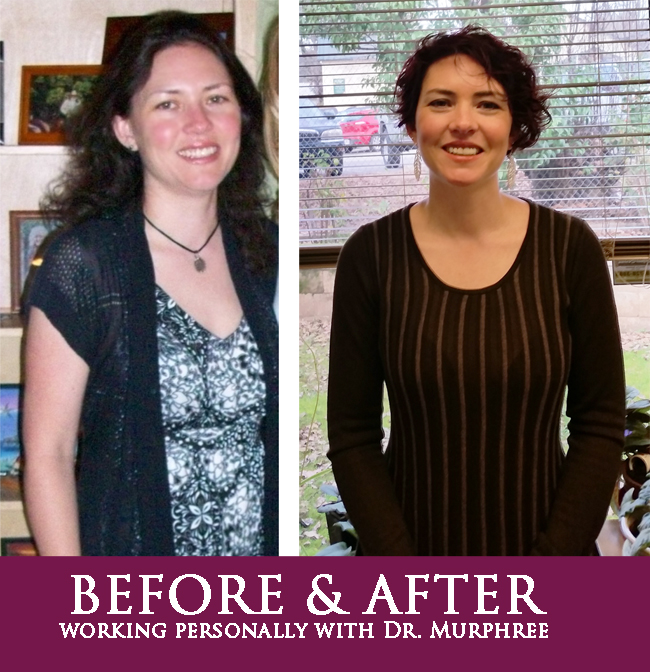Ginger Beats Fibromyalgia and Shares Her Story

Ginger from Beats Fibromyalgia and Shares Her Story
Dr. M:
Good evening this is Dr Rodger Murphree, YourFibroDoctor.com, author of Treating and Beating Fibromyalgia and Chronic Fatigue Syndrome. Thank you for joining me tonight for my weekly Treating and Beating Fibromyalgia teleconference. I look forward to your questions this evening. A little bit about me: I’m a board certified chiropractic physician, board certified nutritional specialist. I’ve been in private practice for 26 years and I have specialized in treating fibromyalgia for the last 18 years. For the last 7 or 8 years, my practice has evolved to 99% of my practice now is phone consults with patients all over the world.
I like to from time to time have patients come on my call and share their story. I do that because in the environment that we have right now for fibromyalgia, basically you’re told that if you have fibromyalgia you just have to learn to live with it. We can help you with the symptoms, we can put you on medications to help you with your sleep, your pain, your low moods and restless legs, but you’re going to have to learn to live with it. The challenge with that is of course learning to live with it, because for most people with fibromyalgia the medications are a dead end at least long term.
Before you know it because you have so many different symptoms, you’re on half a dozen to a dozen drugs covering up the different symptoms, and these symptoms are nothing but warning signs. As I’ve said many times before in this program and in my book, fibromyalgia is a name. It’s a group of common symptoms that people have together, and we call this fibromyalgia. This is a syndrome. Fibromyalgia in and of itself doesn’t cause anything.
Fibromyalgia doesn’t cause low energy, pain, poor sleep … those are symptoms. What you want to do is to find the root causes that are causing the problems with poor sleep, diffuse achy muscle pain, sometimes debilitating pain. You want to find the reason why you get tingling in your hands and feet, why your hair is falling out. You want to find why you can’t get out of bed some days. Those are the things that are driving your illness, but all those are warning signs. There’s something contributing to those; it could be low thyroid, adrenal fatigue, food allergies, it could be numerous things.
I’ve found out the hard way, that the only way you can beat fibromyalgia, and many of you can beat it, whether you call it cure or putting it in remission, my patients really don’t care. All they care about is that they can do the things that they used to be able to do again. They can go to their grandkid’s ball game, they can go on a vacation, they can go shopping, they can clean the house, they can cook dinner, they can go back to work, they can be intimate with their spouse … whatever it is, they’re just glad that they got their life back and they really don’t care what we call it.
You do that, I can assure you that you’re going to stand a very solid chance of feeling good again. It may not be 100% but I assure you doing this for 18 years, and this is the only way that makes sense to me.
Tonight, I’ve got a couple of patients who were kind enough to join me and share their story. Ginger if you’re on the call from California,
Ginger: Hello.
Dr. M:
Hi Ginger, thank you for joining me. It’s been a while since we talked but catch me up. I’d like to hear your story, where you were prior to us meeting and working together. Tell me about your fibromyalgia and some of your health issues before we started working together.
Ginger:
Before we started working together, I had gone through several doctors. It’s hard to pick a date for remembering when I started really feeling bad. I can remember always being kind of a sickly child to be honest, not ever really feeling good consistently. It wasn’t until about 2004 that it started to really take a downward turn. I think at that point doctors were really starting to tell me I was depressed, and that it wasn’t physical. They started to put me on antidepressant medicines, trying different ones … I remember really starting to feel this focus of leg pain. We had adopted a puppy from the pound. When she was about 2 years old, she would get so excited when she would see us that she would jump up to greet you. I remember one time she jumped up and hit my legs, and I literally just collapsed. It hurt so bad and she was not a big dog, she was under 40 pounds. The pain was excruciating and I couldn’t figure out why this little dog barely touching my legs was so painful. I was seeing a doctor at the time who interestingly enough sent me to a cancer doctor. They would run blood work and everything came back “normal.” I remember the cancer doctor laughing, why are you here? It’s not a good feeling. I know he probably wasn’t laughing at me, but that’s what it felt like. I would struggle with the leg pain. It would hurt when someone would touch me or brush up against me, or the dogs sit on your legs. Then I started to see that I was getting fatigued all the time, I had no energy.
The other thing the doctors would tell me is you need to reduce the stress in your life. I would think, I don’t feel stressed … there are things that come up in normal life that are stressful, but not where it’s affecting my whole physical being. Probably about a couple of years after that, I went to a doctor and said I can’t keep taking antidepressants. It’s not helping, I’m not depressed and I’m not a big pill person. She was actually a nurse practitioner and said have you ever been tested for lupus? I came positive for lupus or the ANA, and from there was referred to a rheumatologist who probably after about a year of working with her, she said she felt like I had fibromyalgia.
At that point, it almost felt like a death sentence because it was untreatable, there’s nothing that we can do, you just have to find a way to deal with it. She would tell me you need to go to counseling, and I’m thinking to myself I’m not opposed to counseling but how does that make me not feel like I need a nap? I have to say out of all the doctors, she would encourage me to look outside the box. She actually put me on Plaquenil to see if that would help with any of the symptoms. I would get rashes on my arms and legs and it did treat that, but when I looked at the long term effects of what that medicine can do to you, I felt like is taking a medicine for one symptom which is a rash that’s not painful worth the potential long term side effects of this? She told me to look outside the box and look at alternatives, because there was nothing that she could really do for me. I have to say that forced me into looking and finding you … I feel that was the best thing she ever did, was tell me there was nothing more she could do to help me. I actually thank her for that.
Dr. M:
By the time you got to me, you had pain in your hands, feet, legs, knees and hips … just about all over and you had these headaches. Tell me when we met, where were you at that point? Obviously you had no energy and were really run down.
Ginger:
At that point, I think I was completely overwhelmed. I was hurting, the pain had spread to my hips and legs and my arms. I was having migraines so frequently, it felt like probably every other week. They had tried putting me on medicine which I think looking back on it now, I think it might have helped because I wanted it to help. I’m not sure if it ever really reduced the headache. I would be in bed for at least 24 hours and then have what I call headache hangovers for a day or two after that. One of the things that I pride myself for and I’m recognized for in my profession is that I have the ability to remember things. People would come to me and say, do you remember such and such from 2 years ago and I would remember. I started losing that, I wasn’t able to remember the details that I needed to for my job. I wasn’t able to concentrate. Part of it was the pain and part of it was just tired, and now knowing that it was the brain fog … I wondered if there’s something wrong with me. Your mind goes a million miles an hour about what could be causing you to be not able to concentrate. At the time, I was 35 years old. What in the world could be affecting my brain like this? I don’t drink, I don’t smoke and I was actually still trying to exercise. I would exercise 3-4 times a week, 30 minutes a day and feel like I got run over a truck. I kept telling myself, I have to keep doing this even when I don’t feel like I can because something’s got to give. I have to keep working towards something. I would tell me husband, I’m not even sure I would wish a migraine on my worst enemy.
Dr. M: No, you wouldn’t.
Ginger:
It’s so absolutely painful. I couldn’t figure out what was triggering it and there seemed to be nothing that would help treat it. When I came to you, I was feeling pretty desperate. I thought at that point maybe I do need counseling, because I need somebody to tell me how I’m going to live like this for the rest of my life.
Dr. M:
You had some issues with your sleep, you were really run down. Tell me about your headaches now. Are you having headaches and migraines anymore?
Ginger:
I’ve had a couple, they’re more weather related. In the winter time, I seem to get them but when a storm would come in, I would think I’m going to get a migraine. I think I’ve had one with the last 5 storms we’ve had, and California is actually getting some weather this year. Everyone is excited and I’m thinking oh my God, I’m going to get a migraine … and I haven’t. It’s been very nice to be able to enjoy the rain and not be in pain.
Dr. M:
Absolutely, I’m an old migraine patient myself and they’re miserable. I would have done anything, walked on fire or broken glass to get rid of migraines. We did the food allergy panel and found some food allergies on you. We put you on some over the counter supplements that did the trick and knock on wood, you like the majority of my patients that I work with that have migraines have been able to overcome them and that’s a huge thing.
Ginger:
Yes, you get a little spoiled. The one I had, I was so devastated that I had it and I’m thinking Ginger, you can live with one in 4 months.
Dr. M:
Yeah, I remember when we started working together. I’ve got a note here and I have this in quotes, “Oh my god I haven’t had a migraine in 3 weeks.” You were so thrilled and of course I expected that … not to sound like I’m some great person, but I just knew if we keep digging and finding some underlying reasons for these migraines, I knew we stood a very good chance of eliminating those or at the very least, reducing the frequency and the severity of them. I’m tickled that you’re doing so well there. I have to say that you’re a case in point. I mentioned earlier about a lot of people who see my posts or look at the blog and say I’m healthy. You were probably one of the healthiest people when we started as far as your diet. You ate yogurt with granola and flax … that was your snacks. I put on my questionnaire form be honest, and people tell me I eat ice cream, cookies and cake but you ate incredibly healthy. The other thing was weight was not an issue for you. You were a great weight and you tried the exercise, but even doing those things you weren’t healthy. You want to do those things, I applaud those things. That’s wonderful that you’re proactive, but for fibromyalgia you’ve got to find these underlying triggers. In your case, obviously the food allergies and some of the things that we did to help you with the migraines, we got you sleeping for the first time in a long time, and things fell into place. It was all really about getting healthy, kind of in a different way for you. It wasn’t so much about diet or exercise, it was about fixing the underlying issues with your biochemistry.
Ginger:
I do have a high stress job, so one of the things I’ve always done and that I actually teach is about self care. If you want to continue to do the profession that you’re working, you have to really focus on taking care of yourself. I would teach classes and really advocate for that, and then I would come home and feel like death. I would think everybody is having donuts and I’m having granola. Everybody is doing these things that are bad for them and I’m doing all these healthy things, yet I feel horrible. It was like, what am I doing wrong or what am I not doing? It would be very overwhelming to come home. I don’t like to miss work, and there would be days where I would have to convince myself … it took everything I had to get out of bed. There would be times I’d shut my door to my office, I would literally have to lay my head on my desk, set a timer and take 15 minutes because I could not keep my eyes open. I’d get home and get to bed and I couldn’t sleep, so it was just this cycle that I got in. One of the biggest fears I had when I first started working with you was, oh my gosh I’m not be able to eat foods that I love. Once you figure out that those foods are maybe making you feel bad, I will give up bread and milk to the end of the world to feel this good again. Even though I thought I was eating ‘healthy’, I wasn’t considering that some of those foods could be triggering some of my symptoms.
Dr. M:
What was it like working with me by phone, because that’s a big step for a lot of people? You’re in California and I’m here in Birmingham Alabama so we’ve got to do it by phone, but what was that process like?
Ginger:
It was great. To be honest, it was sometimes better than sitting across from a doctor who you felt wasn’t really paying attention. I thought that it was always convenient, we had a good conversation. It never felt disconnected or anything like that. It always worked within my schedule. I didn’t have any concerns about doing it over the phone. I think that once I started feeling better, sleeping and feeling just a little bit more energy, you probably could have told me Ginger you’re going to have to fly here and I would have. The meetings on the phone are great and your staff have been so fantastic to work with. I call to order something and I have it immediately, or if I have a question … I actually felt more connected than I did to most doctors than I’ve seen locally.
Dr. M:
What would you share with those that are listening to this or maybe the replay? What would you like to share with them about going through this get healthy program with me?
Ginger:
The first thing is be patient with yourself. It took a long time to get to the point where you’re at now, and it’s going to take some time to start feeling better. There’s light at the end of the tunnel and it’s no longer a moving train towards me. It’s the light that I’m feeling better. I’m 40 years old and if I want to go on a bike ride or vacation with my husband, I’m not thinking is he going to be disappointed because I’m going to spend some time napping. If I want to chase my god-daughter around the park, I’m not going to need a nap anymore afterwards. You just have to realize that there is light at the end of the tunnel. Be patient with your body and let it heal itself, because it has the power to do that.
Dr. M:
Absolutely. Ginger, thank you so much for joining me tonight. You’re such a wonderful person and I really have enjoyed our relationship, and I look forward to you continuing to do so well.
Ginger: Thank you very much. I appreciate you and your staff very much, and you probably haven’t heard the last of me.
Dr. M: I’m sure not, you’re part of the family now. Have a great evening.
Ginger: You too, bye.
Dr. M:
You got to hear a little bit about Ginger sharing her story. As I mentioned earlier, sometimes people are doing a lot of the right things and they just can’t pull it all together; she was certainly that case. One thing we didn’t really talk about was, she had some basic testing and of course “ it was all normal.” Isn’t that what they always tell you, “your blood work looks good.”
She had some issues with her thyroid. Because she looked healthy as a lot of patients with fibromyalgia do, they were doing the basic blood work and they missed it. By doing special comprehensive testing I was able to find and fix her low thyroid issues. That was one of the underlying things that was causing her fatigue, among other things. The other thing is she had some anemia issues that were missed, so we caught that with special testing, and got her on some iron. Fortunately she was proactive enough and she reached out to me all the way from one coast to another, and now she’s got her life back.
Join Me Every Week For My Free Treating and Beating Fibromyalgia Facebook LIVE @ 6pm CST
These patients and hundreds of others who’ve worked personally with me have in fact beaten their fibromyalgia. You can read or listen to their stories by clicking the link below:
|
|









How much is the phone consultation? Do you accept insurance?